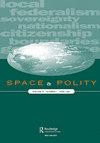本体论政治和瓜拉尼-凯奥瓦世界的斗争
IF 1.1
Q2 GEOGRAPHY
引用次数: 9
摘要
本文考察了土著人民在抵抗侵略、收回土地和失去主流发展机会的努力中的政治视角。讨论基于对南美洲瓜拉尼-凯奥瓦人如何维持社会空间认同、如何对特定社会空间不公正作出反应,同时如何将他们的斗争与其他原住民团体的运动联系起来的调查。这个具体的例子有助于展示政治本体论作为一种工具的应用,用于质疑西方现代性的影响、农业资本主义的进步以及与相关的次等政治的共性。本文章由计算机程序翻译,如有差异,请以英文原文为准。
Ontological politics and the struggle for the Guarani-Kaiowa world
ABSTRACT The article examines the political perspective of Indigenous peoples in their effort to resist aggression and reclaim back land and opportunities lost to mainstream development. The discussion is based on an investigation into how the Guarani-Kaiowa of South America have been able to maintain a socio-spatial identity, react to specific socio-spatial injustices and at the same time associate their struggle with the campaign of other Indigenous groups. This concrete example is instrumental for demonstrating the application of political ontology as a tool for interrogating the impacts of Western modernity, the advance of agrarian capitalism and commonalities with related subaltern politics.
求助全文
通过发布文献求助,成功后即可免费获取论文全文。
去求助
来源期刊

SPACE AND POLITY
GEOGRAPHY-
CiteScore
4.10
自引率
4.20%
发文量
19
期刊介绍:
Space & Polity is a fully refereed scholarly international journal devoted to the theoretical and empirical understanding of the changing relationships between the state, and regional and local forms of governance. The journal provides a forum aimed particularly at bringing together social scientists currently working in a variety of disciplines, including geography, political science, sociology, economics, anthropology and development studies and who have a common interest in the relationships between space, place and politics in less developed as well as the advanced economies.
 求助内容:
求助内容: 应助结果提醒方式:
应助结果提醒方式:


